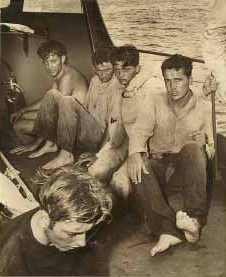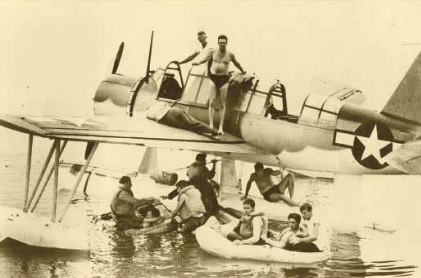

Adrift: Coast Guard Cutter Jackson
Story by by PA2 Judy Silverstein,
USCGR
http://www.uscg.mil/hq/g-cp/cb/PDFs/Issue_2_2006.pdf
“I said, ‘well Ruhl, whaddya do now?’ ”
Luckily, a raft torn from the ship’s deck floated by and Ruhl grabbed it. He would spend the next several hours struggling and watching as his ship and the Bedloe were tossed at sea, taking many still-trapped members of both crews.
“The waves were like mountains rolling over the ship,” he says, shaking his head. To see the ship he called home for months lying on its side and sinking, was a bit overwhelming for a young man. Ruhl said he lost a certain taste for the sea after that defining moment.
What became known as the Great Atlantic Hurricane of 1944 was the equivalent of a category 4 storm, causing damage along the entire Eastern seaboard. All told, 48 men from both cutters lost their lives in the infamous storm. The Vineyard Sound Lightship #73, was also lost in the storm, with all 12 crewmembers losing their lives.
The raft’s wooden slat bottom was lashed to an inner tube with rope, barely leaving room for those desperate for support. About six to eight men joined him aboard the crude raft taking turns through the night, holding on or sitting astride it, says Ruhl.
At sunrise the next morning, The North Carolina skies had cleared as the sun shone brightly. Ruhl admits to a certain conviction they would be rescued. Yet the indelible memories of men floating in a debris field can still stir strong emotions, he says.
There were also other emotions among the crew. As they struggled to share their makeshift inflatable life support off the North Carolina coast, they agreed to not drink the milk cartons and to save the water in jugs lashed to the raft. But as the men dozed, one young man helped himself to a long swig, when a large waved tossed the jug out of his hands and out to sea. That made a bad situation somewhat worse, says Ruhl who admits to some lingering disgust about the incident.
A Navy plane passed overhead and the men waved. But as the sun set two more times, the men became a bit desperate, relying on Ruhl to recite the Lord’s Prayer to restore their hope.
“I don’t recall what we talked about at sea, but I do know the prayers helped,” he says. “I’d have to say, looking back there was a great feeling of divine intervention and answering of prayers.”
On day three, the naval pilot made another lucky pass overhead. A photo taken within mere hours of the rescue, shows Ruhl sitting on a wing of the Naval airplane flown by Joe Webber, whose name Ruhl recalls with little effort. Fingering a crew manifest, Ruhl still brightens up when speaking his name. Awaiting transport by a vessel, back to shore, Ruhl looks a little worn in the photo. He also recalls seeing sharks circling for the first time, and considered how lucky he and 18 others had been for three days to only encounter a few jellyfish and Portuguese man-of–war.
Meanwhile, some 1,000 miles away back in Pennsylvania, Ruhl’s parents were at a dinner party when they heard the celebrity radio commentator Gabriel Heatter announce: “Bad news…Two Coast Guard ships have sank. There are only a few survivors.” Though gut wrenching news, Ruhl’s dad remained optimistic, announcing his son was a strong swimmer and would be one of the survivors.
A short hospital stay in Elizabeth City, N.C., promised hot meals, which had great appeal. One year later, he finished his military obligation and left the Coast Guard for Pennsylvania and pursuit of a college education. Using his GI Bill, he attained a master’s degree at Bucknell University, later becoming a high school educator in social studies. Later, he worked as a guidance counselor, principal and superintendent. His unique perspective on World War II likely gave him an edge in helping interpret the role of history for students.
Ruhl still enjoys being interviewed by novelists and despite the late hour, unfurls a chart depicting exactly where the Jackson sunk to a watery grave. Though retired since 1979, Ruhl stays active in his community, unfailingly representing the Coast Guard by marching in the annual Lewisburg Fourth of July parade, which attracts attendees from beyond the state’s borders. A champion of the smallest of the military services, he has an unflinching dedication after all these years. And despite an unforgettable and historic few days at sea, his loyalty remains steadfast. “I learned to love the Coast Guard,” said Ruhl, now a landlubber by all accounts.
As he stands to acknowledge his role as a former Coast Guardsman at Wolfe Road, remembering the strains of Semper Paratus brings a smile to his face.
 |
 |
| William Ruhl, third from the left, rests aboard a transport ship with other survivors of the ill-fated Coast Guard Cutters Jackson and Bedloe. Ruhl spent three days and two nights at sea clinging to a makeshift life raft. | Survivors of the Coast Guard Cutters Jackson and Bedloe climb aboard the wings of the Navy sea plane that sighted them after three days adrift at sea when their cutters sank in the Great Atlantic Hurricane of 1944. |